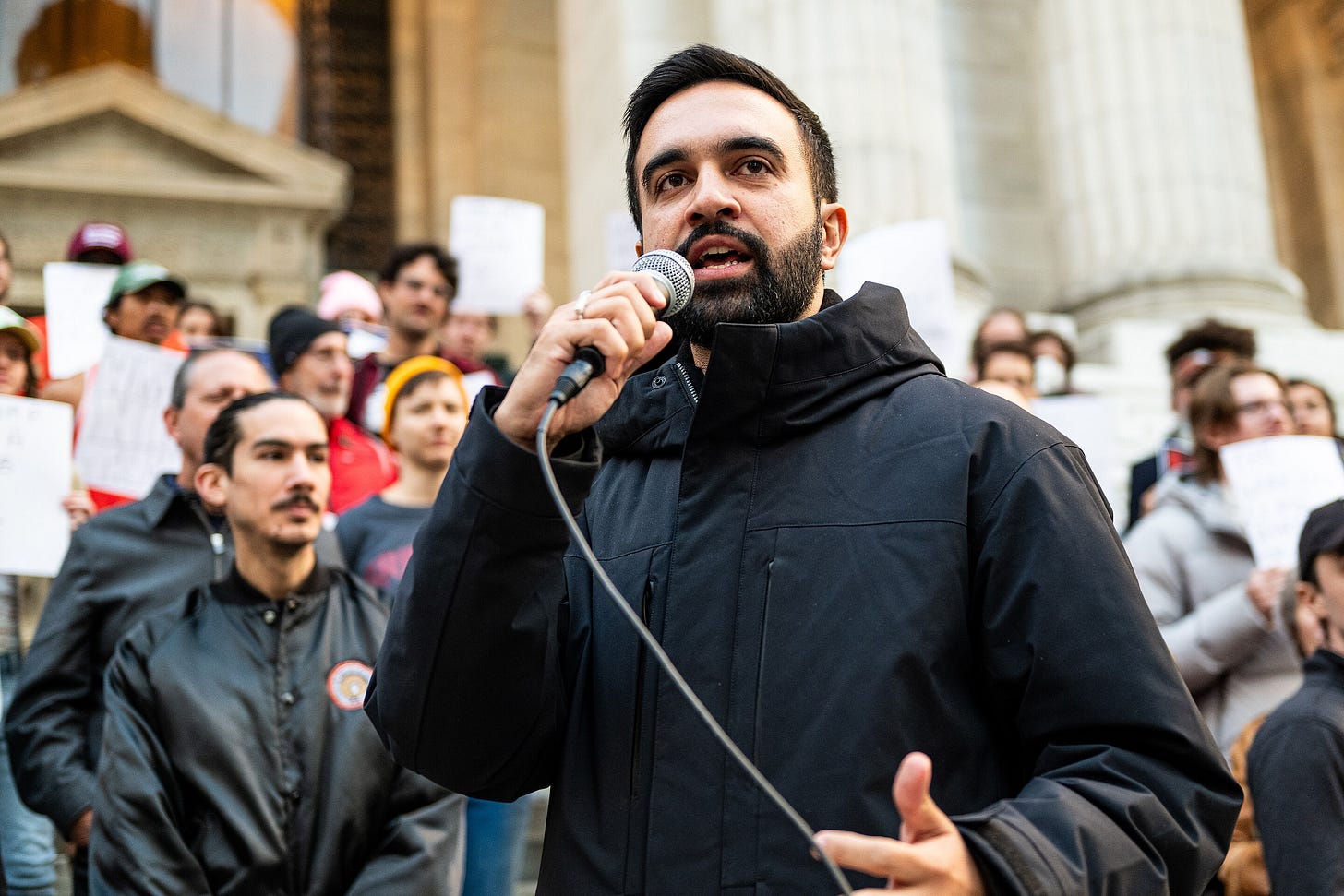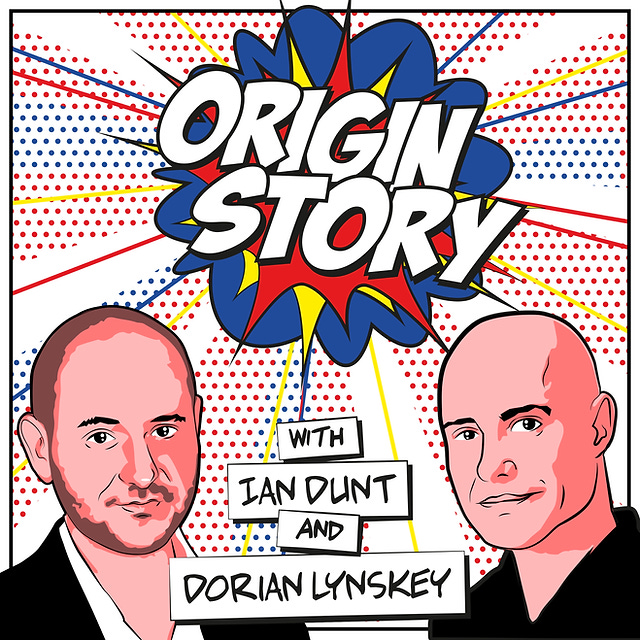The Night I Got Gently Radicalised at the Tabernacle by Ian Dunt and Dorian Lynskey
An Origin Story live show, a plastic cup of red wine and more questions than answers - in the best way possible.
Last night I had the pleasure of taking a bit of an adventure with the lovely
- specifically, to go watch Origin Story Live in the Tabernacle in Kensington. She very kindly allowed me to gatecrash her evening out, and what an evening it was!I’ve been listening to the Origin Story podcast for a while now, and it’s a regular feature for my bus/train/walking/travelling-across-the-city listening - and while I definitely expected to leave feeling well informed, entertained and slightly annoyed at the state of politics, what I was not expecting was walking out radicalised1.
Dorian Lynskey and
kicked off the show in the same conversational, almost haphazardly annoyed way that I’ve come to know and love from the podcast, and launched pretty much immediately into the meat of the first half - a discussion about James Orr - a man who appears to be connected to absolutely everyone worthOrr was recently made a senior advisor to none other than media darling and man-of-the-people-just-not-in-Clacton, Nigel Farage, while simultaneously heading up the Centre for a Better Britain3 (which previously had the moniker of Resolute 1861) - a think tank that has a very strong whiff of Project 2025 about it, something that I went into a fair bit of detail with in October.
In short, Orr is a man with a buss pass between what seems to be every major node of the far-right ecosystem, stretching all the way from JD Vance to Jordan Peterson to Peter Thiel, those trio of names alone being a triad of very worrying positions in the current political sphere.
Lynskey’s run through of Orr’s connection was sharp, witty and unsettling - or pretty much exactly what you would expect from Origin Story at its best - meticulously detailing the ascendance of this particular political rot, while at the very least giving you a laugh at the sheer batshittery of it all at the same time.
The second half of the show was where it became quite interesting though, and the bit which really stuck with me and left me with more questions than answers - in the best way possible. The discussion in this segment was about two very exciting political figures on the left of politics; Zohran Mamdani who recently won the New York City Mayoralty, and Zack Polanski here in the UK, who has managed the near impossible and actually caught the attention of the British press.
Already being one of the most exciting figures in American politics since Barack Obama, Mamdani has become an object of cross-Atlantic optimism. His spectacular performance in the NYC election against Andrew Cuomo (who stood as an independent, but was still well and thoroughly fused to the Democratic Establishment) and a Republican candidate that, I’ll be honest, I haven’t even really bothered to look up because they’re so irrelevant in this context.
Mamdani is, without a doubt, a charismatic man, but more than that he’s also sincerely, relentlessly and unapologetically political. He has a distinct knack of identifying problems in terms that people can connect with, he can clearly articulate power structures and he has managed to engage meaningfully with constituencies that have been left out of the room since probably the 1990s. His ability to really communicate left-wing politics without softening it into soup is truly impressive, and during the discussion, there was genuine excitement in the Tabernacle.

Zack Polanski, a politician that has genuinely impressed me in the months since become Green Party leader was treated a little bit differently - not badly, not in any sense, but certainly more critically, and with good reason.
Both Dunt and Lynskey recognised that he has been doing something unusual for a politician on the left of British politics - he’s been creating genuine momentum that we haven’t seen since 2017. But, there was also well-founded hesitation about his approach of embracing the term “populist” - even in the positive, bottom-up sense that Polanski intends.
It down, in a large part, to the framing - the politics of the “people vs the elite”, that has Dunt’s eyebrows raised in particular, and I wouldn’t say because the substance is wrong (there is serious inequality when it comes to especially income globally, and specifically in Britain), but because of how easily that can be borrowed, manipulated or flipped by someone less principled.
It was this discussion though, which I was listening to intently while sipping red wine of an unknown cultivar out of a plastic cup4, that raised a question in my head. The question of “the people”, “the elite” and whether we on the left are now finally beginning our own experiment with our own brand of populist politics that had me rapidly tapping out notes and questions to myself.
I began wondering whether we’re standing on the edge of something genuinely politically interesting - a moment during which both the left and the right have inadvertently turned our joint frustrations on the same target, but with what are radically different motivations. Could we be living in the opening act of what is a major political transition, moving away from the way we’ve always done things, getting ready to flip over the table? And on the subject of tables, could we, on the left, be particularly annoyed that perhaps the right got to the flipping of tables before we did?
And if so, does that mean that the left is finally at a point where we’re able and willing to make a bit of a mess?
Because there is a distinct symmetry about the political resentments of the last seventeen years or so. Of course the right has well and thoroughly dominated the “burn-it-all-down” aesthetic with their players in the form of Trump, Farage, Wilders, Le Pen, Meloni and Milei (among other chaos merchants) who have taken turns in pissing all over the furniture, but at the same time, the left has, in its own way also been in a state of long, low-level fury too.
The difference it feels to me is that to date we’ve mainly conducted and controlled our rage indoors, more politely and self-constrained by democratic norms.
If it’s the case that the right initially flipped over the table in 2016 because they were bored, angry and felt ignored, there’s an argument to be made that the left have been eyeing that proverbial damned table since 2008 when the financial crisis exposed the sheer hollowness of centrist economic management - but instead of getting an opportunity to flip it, we got bundled with austerity instead and spent our time being ineffectually outraged about it.
Alternatively - and maybe even more convincingly - it might just be that we, on the left, flipped the table first, all the way back in 1997. While I wasn’t living in the country at the time, the fact that Britain had become Global Britain did expose me to the sexiness of the liberal optimism that came out of the UK - and while the US in the 2000s was dominated by Bush, 9/11 and a distinct pivot to conservatism (small-C, not the mess we have now), 2008 saw the election of Obama, which really did flip things over.
I don’t think it’s unreasonable to think that the rise of the right that we’ve seen since the 2010s was a furious reaction to the progress that we’d seen - a full-on-weapons-grade-fannywobble to the idea that the world was tilting that much more inclusive, internationalist, gay, brown, trans and more everything that the right had spend decades trying desperately to avoid.
This being the case, then it could very well be that we’re not necessarily watching the left attempt to replicate right-wing populism - rather we’re watching the left reclaim the energy it lost while the right was busy clutching their pearls5 loudly. Zack Polanski doesn’t strike me as the left-wing Farage (thank God), but he does strike me as one of the very politicians on the left who have been willing to speak about power and power imbalances not just with honesty, but with energy - and that more than necessarily charisma or “populism” is what the left does need if we’re ever going to be something other than the sensible alternative you keep meaning to vote for in the future.
Lodged between the questions about the overlap between right and left, I also had questions about the centre - specifically whether we are entering a time in which the centre will completely collapse, and the only functional politics becomes anti-establishment politics? And if so, is that a good thing? Bad? Unavoidable?
Historically, when the centre collapses in on itself, it doesn’t go all that well for people, and the early 20th century, filled with the Russian Revolution, collapse of the Ottoman Empire and the rise of Fascism in the same two decades resulted in a world that was inherently very unstable and the outcomes were, to put it lightly, catastrophic - and what worries me is that many of the features of that time feel familiar now: mass disillusionment, the erosion of institutional trust, competing narratives of who actually speaks for the people and “elites” and establishments that spend more time talking to each other than anyone else.
I left the Tabernacle last night without a clear conclusion, but with a sense that the political currents under our feet are rapidly shifting - far, far more rapidly than any of our current commentariat necessarily wants to admit.
The right has had a long ten years now of defining what “challenging the establishment” looks like (chaotic, grievance driven, more than occasionally completely unhinged), but more importantly, that they’re not the only ones that are capable of harnessing the time of discontent we’re living in.
In the end, what the evening with Dunt and Lynskey really left me feeling wasn’t necessarily the sense that the left should stay calm, polite or within its eternal lane of nuance - quite the opposite. I came to the realisation that the real mistake hasn’t been that we on the left aren’t angry enough or even too angry - that we’ve been too angry indoors, far too quietly and respectably.
We’ve been sticking to within what the “establishment” considers to be “reasonable behaviour”, while the right, since 2015, has spent their time truly setting things on fire - institutions, treaties, alliances, basic facts and reality - while we on the left have been trying to smother sparks with damp parliamentary procedure.
Could the answer instead be not to keep everything intact - but to choose the things we’re willing to burn?
The truth is, there are things that deserve to go up in smoke - the broken economic consensus, the myth of centrism as the only means of competence, the fantasy that politics is something done by sensible men and women in sensible suits while the rest of us keep waiting for the outcomes that never seem to arrive. These are structures that have been collapsing in on themselves far before the populist right swaggered in with their box of matches, and if something is already falling apart, refusing to go near it doesn’t make you noble or sensible - it just makes you irrelevant.
I have a strong feeling that this may just be the work that’s ahead of us - not pretending the old order can be coaxed back into shape, but being brave enough to let the brittle bits fall off and intentional enough to build something that’s a bit sturdier and a bit more robust in their place.
To end with, because I’ve just realised I have (as usual) rambled on far too long - Origin Story Live really was spectacular, and I have to thank Lynskey and Dunt both for the new questions they’ve raised. If you have the opportunity to see them live - please do so. If not, give Origin Story a listen6, you’ll always finish feeling entertained, educated and a little bit more curious about the world.
Bearly Politics is fully reader-supported with no corporate backers, oligarchs or thinktanks - not even a single benevolent but eccentric hedge-fund uncle. If you can support with a paid subscription, it genuinely helps.
If not, sharing this post is a massive boost as well.
I jest - the radicalisation came much earlier from a combination of living in London, Zack Polanski and the homosexuality - still the show added a lovely sheen.
The other concern worth noting when it comes to Orr is his ownership of multiple chalets - a point that seemed to perturb Lynskey especially. And rightly so.
Which also very conveniently has an office in the same building as Reform. How terribly shocking.
I am, of course, traumatised, but ultimately will survive. It was fine.
I have specifically put that term in here because I now know that it annoys Ian Dunt - and I’m not even sorry.
Standout mentions in terms of the best origin stories: Daily Mail, BBC, Thatcherism, Jordan Peterson and Ayn Rand - each one well worth a listen.





The right are regressive. So when they throw a wobble it is about reaching for a fantastical better time in the past.
And being regressive their proposed solutions are unfit to resolve problems here and now.
Mamdani and Polanski address human and societal problems with clarity and humanity.
And therein lies their potential route to success.
We keep forgetting that democracy as we currently experience it is actually very young in terms of human development. In UK, in a recognisable form it really only dates from the end of WW2, so it's less than a hundred years old. It's still in development, and we mustn't forget that. It's an experiment. Sometimes in experiments it's necessary to change the parameters, or change the materials, or wipe the entire petri dish clean and start again.